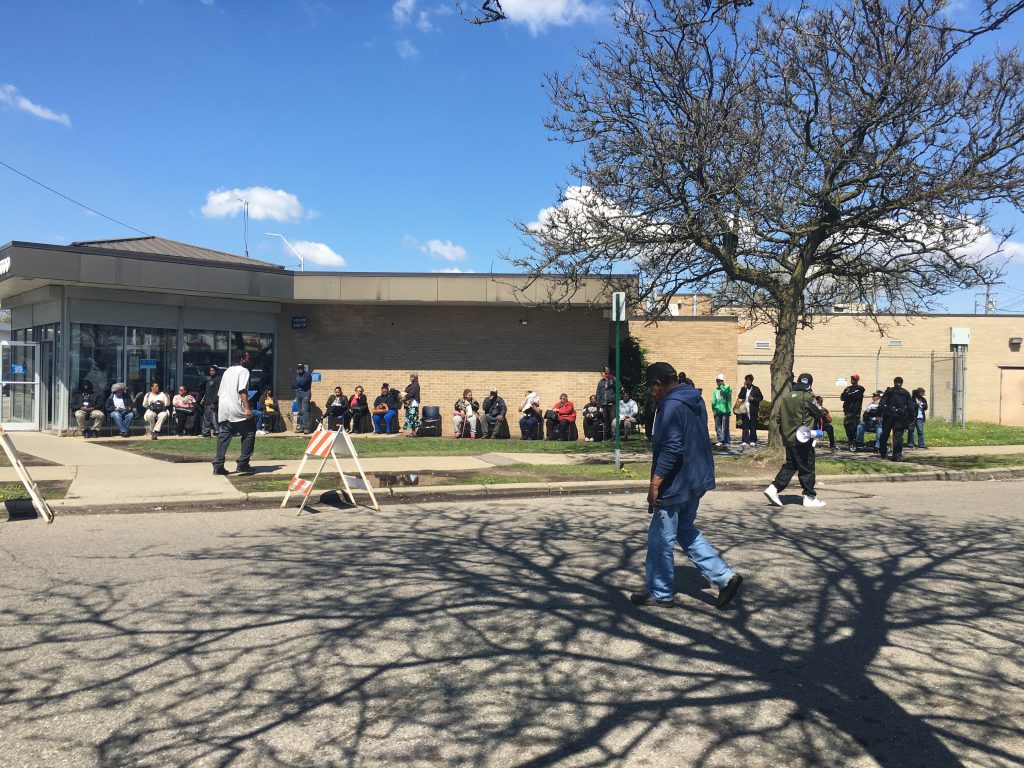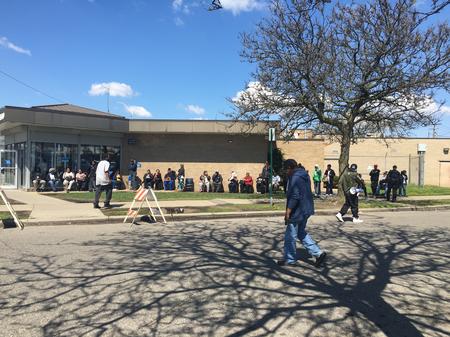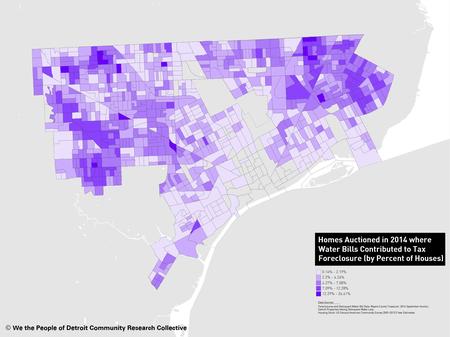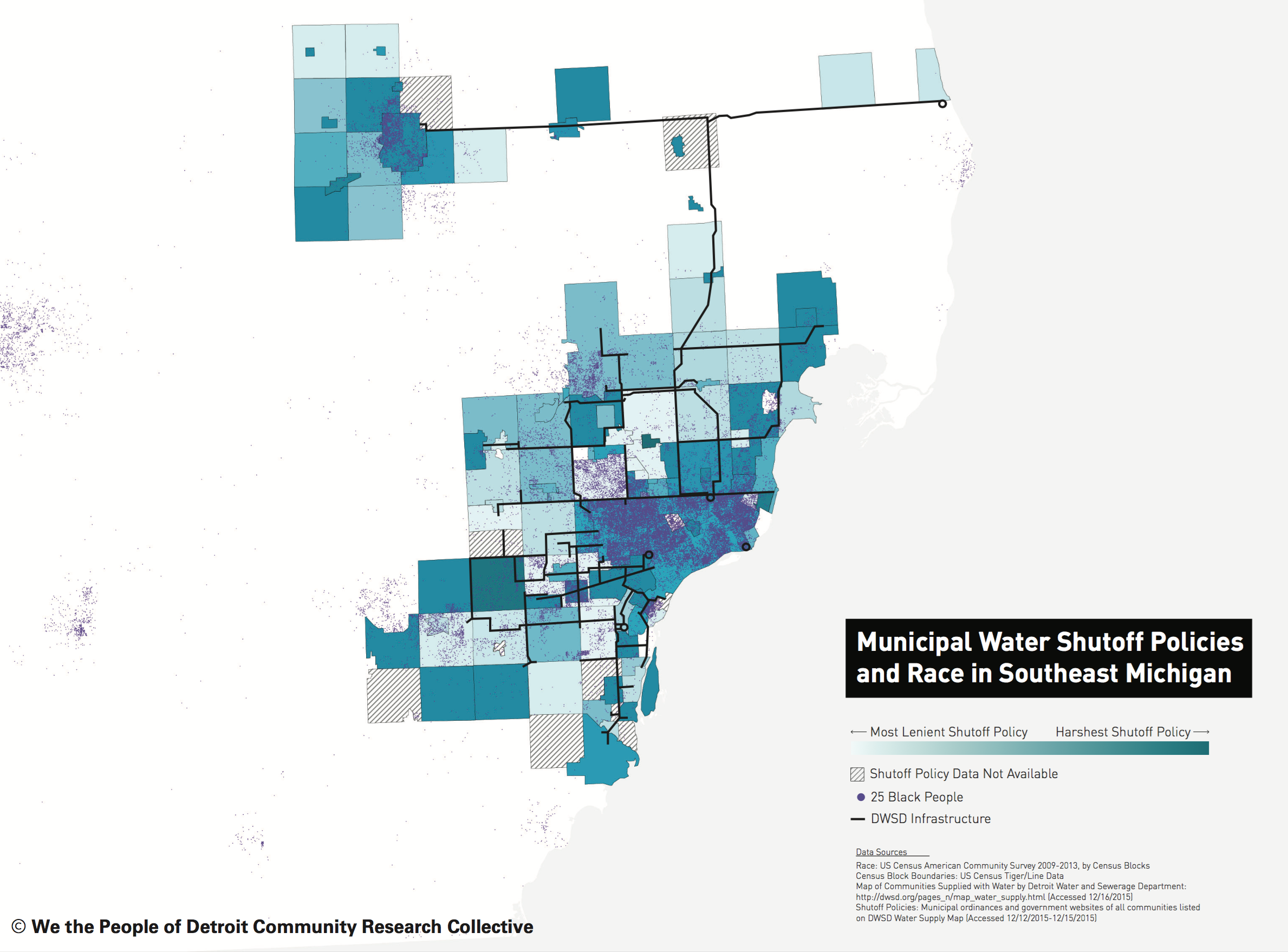Water Shut-Offs Linked to Foreclosure in Detroit [Map]
A grassroots research collective has mapped out water-shut offs and foreclosure, claims the two are connected to race.


On the corner of Grand River and Winthrop, a preacher took to the street with a megaphone in hand. Close by, a police officer helped people form two lines outside the Detroit Water and Sewerage Department’s Westside Customer Service Center. One line was for regular water payments. The other, longer line was for people facing water shut-offs. That’s where Iris Riley waited. She said her landlord told her to pay the water bills when she first started renting.“When I came here to get the water turned on in my name,” Riley said. “The water company told me, in September, that there was nothing I could do because the man that was on my lease, he’s not the owner!” Riley says she later found out the mortgage wasn’t being paid.
“So now I’m about to be put out on the streets. I’ve got no water, no way of getting water, and a house in foreclosure and here I’ve been since August of last year, and I have receipts, I’ve been paying this man $650 faithfully.”
Iris Riley, Detroit resident
More than 20,000 homes in Detroit faced water shut-offs this spring after falling behind on bills. For the last year-and-a half, a group of activists and academics, called the “We the People of Detroit Community Research Collective,” has mapped out water shut-off and foreclosure trends in the city. Emily Kutil is an adjunct professor of architecture at the University of Detroit Mercy and one of the group’s researchers. According to her, the link between water shut-offs and foreclosure is a matter of state and city law. “Water bills in the city of Detroit and the state of Michigan, it’s legal to roll a water bill over to a person’s property taxes so for the city of Detroit,” Kutil said. “If you don’t pay your water bill for a year, it gets rolled over onto your property taxes, and if you can’t pay your property taxes for three years, your property gets foreclosed.” Officials with the Detroit Water and Sewerage Department said that practice stopped two years ago, but Kutil said when you look at the number of foreclosed homes that get auctioned off with outstanding water bill debt, especially in neighborhoods far from the city’s commercial center, there’s a clear trend.
“This process happens every year. If you’re looking at a place where over a quarter of the homes in a census block were auctioned in just one year because water contributed, you can sort of understand the scale of this problem and the scale in which it affects homes in Detroit.”
Emily Kutil, Adjunct Professor of Architecture, University of Detroit Mercy

According to Detroit Water and Sewerage Community Engagement Officer Heaster Wheeler, there are programs to help residents who are falling behind on payments. The Water Residential Assistance Program, or WRAP, can give households $25 a month to help with payments and can generate credit towards outstanding bills and plumbing repairs.
“Our objective is not to shut people off, our objective is to get people on payment plans who have fallen delinquent.”
Heaster Wheeler, Detroit Water and Sewerage Community Engagement Officer

But “We the People of Detroit” President and CEO Monica Lewis-Patrick claims there’s another motive at play.
“It seems as though that there is a well-developed, strategic plan to remove people from the city of Detroit, and many of them are poor and they’re black and brown. And then, there seems to be an incentivizing of others coming into the city to take over those homes and that property and that land.”
Monica Lewis-Patrick, President and CEO of “We the People of Detroit”
Lewis-Patrick said “We the People of Detroit” started in reaction to Judge Steven Rhodes’ decision not to end water service shut-offs during Detroit’s bankruptcy. According to officials with the Detroit Water and Sewerage Department, of the city’s 175,000 customers, 50,000 still need help making water bill payments. Now that the Great Lakes Water Authority has been created, the research collective says Detroit has lost even more control of its water resources.
